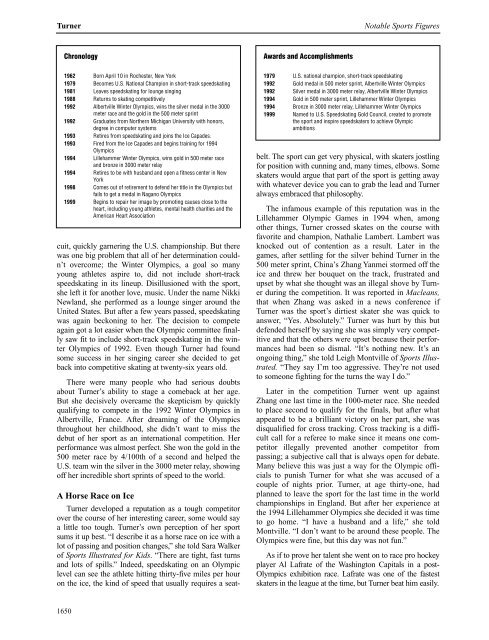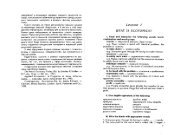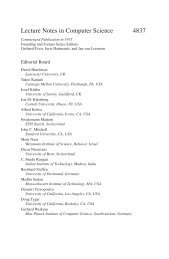Frank Thomas
Frank Thomas
Frank Thomas
You also want an ePaper? Increase the reach of your titles
YUMPU automatically turns print PDFs into web optimized ePapers that Google loves.
Turner Notable Sports Figures<br />
Chronology<br />
1962 Born April 10 in Rochester, New York<br />
1979 Becomes U.S. National Champion in short-track speedskating<br />
1981 Leaves speedskating for lounge singing<br />
1988 Returns to skating competitively<br />
1992 Albertville Winter Olympics, wins the silver medal in the 3000<br />
meter race and the gold in the 500 meter sprint<br />
1992 Graduates from Northern Michigan University with honors,<br />
degree in computer systems<br />
1993 Retires from speedskating and joins the Ice Capades.<br />
1993 Fired from the Ice Capades and begins training for 1994<br />
Olympics<br />
1994 Lillehammer Winter Olympics, wins gold in 500 meter race<br />
and bronze in 3000 meter relay<br />
1994 Retires to be with husband and open a fitness center in New<br />
York<br />
1998 Comes out of retirement to defend her title in the Olympics but<br />
fails to get a medal in Nagano Olympics<br />
1999 Begins to repair her image by promoting causes close to the<br />
heart, including young athletes, mental health charities and the<br />
American Heart Association<br />
cuit, quickly garnering the U.S. championship. But there<br />
was one big problem that all of her determination couldn’t<br />
overcome; the Winter Olympics, a goal so many<br />
young athletes aspire to, did not include short-track<br />
speedskating in its lineup. Disillusioned with the sport,<br />
she left it for another love, music. Under the name Nikki<br />
Newland, she performed as a lounge singer around the<br />
United States. But after a few years passed, speedskating<br />
was again beckoning to her. The decision to compete<br />
again got a lot easier when the Olympic committee finally<br />
saw fit to include short-track speedskating in the winter<br />
Olympics of 1992. Even though Turner had found<br />
some success in her singing career she decided to get<br />
back into competitive skating at twenty-six years old.<br />
There were many people who had serious doubts<br />
about Turner’s ability to stage a comeback at her age.<br />
But she decisively overcame the skepticism by quickly<br />
qualifying to compete in the 1992 Winter Olympics in<br />
Albertville, France. After dreaming of the Olympics<br />
throughout her childhood, she didn’t want to miss the<br />
debut of her sport as an international competition. Her<br />
performance was almost perfect. She won the gold in the<br />
500 meter race by 4/100th of a second and helped the<br />
U.S. team win the silver in the 3000 meter relay, showing<br />
off her incredible short sprints of speed to the world.<br />
A Horse Race on Ice<br />
Turner developed a reputation as a tough competitor<br />
over the course of her interesting career, some would say<br />
a little too tough. Turner’s own perception of her sport<br />
sums it up best. “I describe it as a horse race on ice with a<br />
lot of passing and position changes,” she told Sara Walker<br />
of Sports Illustrated for Kids. “There are tight, fast turns<br />
and lots of spills.” Indeed, speedskating on an Olympic<br />
level can see the athlete hitting thirty-five miles per hour<br />
on the ice, the kind of speed that usually requires a seat-<br />
1650<br />
Awards and Accomplishments<br />
1979 U.S. national champion, short-track speedskating<br />
1992 Gold medal in 500 meter sprint, Albertville Winter Olympics<br />
1992 Silver medal in 3000 meter relay, Albertville Winter Olympics<br />
1994 Gold in 500 meter sprint, Lillehammer Winter Olympics<br />
1994 Bronze in 3000 meter relay, Lillehammer Winter Olympics<br />
1999 Named to U.S. Speedskating Gold Council, created to promote<br />
the sport and inspire speedskaters to achieve Olympic<br />
ambitions<br />
belt. The sport can get very physical, with skaters jostling<br />
for position with cunning and, many times, elbows. Some<br />
skaters would argue that part of the sport is getting away<br />
with whatever device you can to grab the lead and Turner<br />
always embraced that philosophy.<br />
The infamous example of this reputation was in the<br />
Lillehammer Olympic Games in 1994 when, among<br />
other things, Turner crossed skates on the course with<br />
favorite and champion, Nathalie Lambert. Lambert was<br />
knocked out of contention as a result. Later in the<br />
games, after settling for the silver behind Turner in the<br />
500 meter sprint, China’s Zhang Yanmei stormed off the<br />
ice and threw her bouquet on the track, frustrated and<br />
upset by what she thought was an illegal shove by Turner<br />
during the competition. It was reported in Macleans,<br />
that when Zhang was asked in a news conference if<br />
Turner was the sport’s dirtiest skater she was quick to<br />
answer, “Yes. Absolutely.” Turner was hurt by this but<br />
defended herself by saying she was simply very competitive<br />
and that the others were upset because their performances<br />
had been so dismal. “It’s nothing new. It’s an<br />
ongoing thing,” she told Leigh Montville of Sports Illustrated.<br />
“They say I’m too aggressive. They’re not used<br />
to someone fighting for the turns the way I do.”<br />
Later in the competition Turner went up against<br />
Zhang one last time in the 1000-meter race. She needed<br />
to place second to qualify for the finals, but after what<br />
appeared to be a brilliant victory on her part, she was<br />
disqualified for cross tracking. Cross tracking is a difficult<br />
call for a referee to make since it means one competitor<br />
illegally prevented another competitor from<br />
passing; a subjective call that is always open for debate.<br />
Many believe this was just a way for the Olympic officials<br />
to punish Turner for what she was accused of a<br />
couple of nights prior. Turner, at age thirty-one, had<br />
planned to leave the sport for the last time in the world<br />
championships in England. But after her experience at<br />
the 1994 Lillehammer Olympics she decided it was time<br />
to go home. “I have a husband and a life,” she told<br />
Montville. “I don’t want to be around these people. The<br />
Olympics were fine, but this day was not fun.”<br />
As if to prove her talent she went on to race pro hockey<br />
player Al Lafrate of the Washington Capitals in a post-<br />
Olympics exhibition race. Lafrate was one of the fastest<br />
skaters in the league at the time, but Turner beat him easily.

















